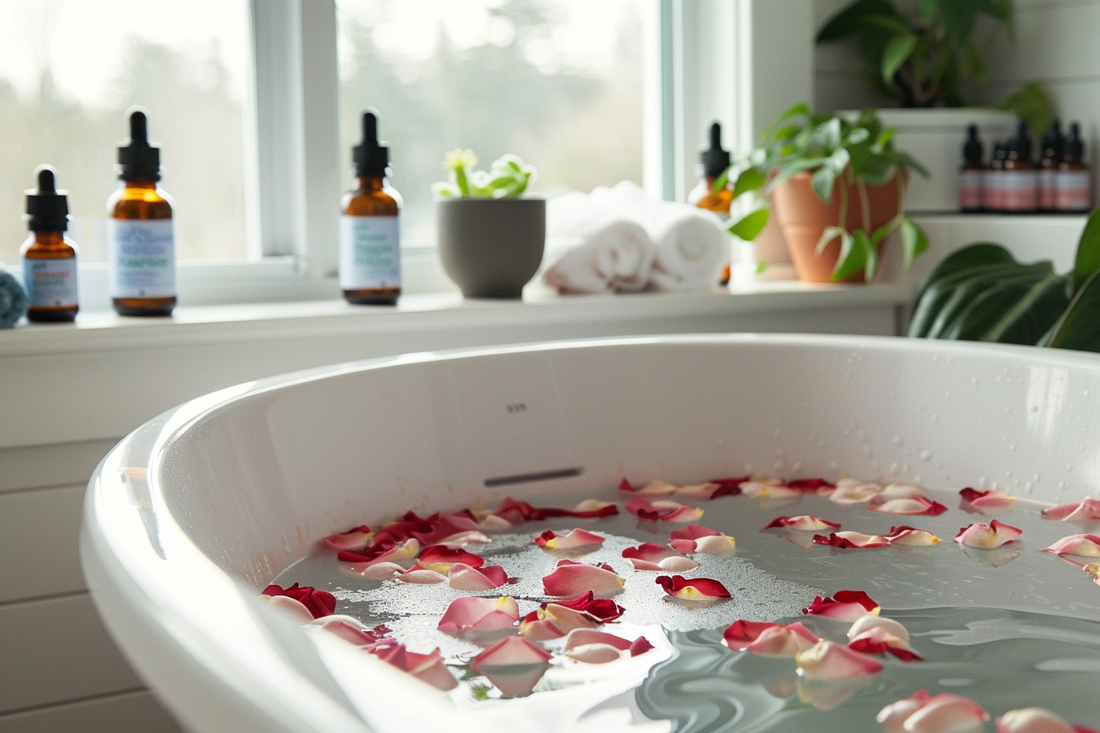
Can You Add Essential Oils to Your Bath?
Imagine turning your bathtub into a soothing retreat. Using essential oils can elevate your bath into a relaxing, aromatic experience. But safety is key.
This article covers everything you need to know. Learn how to safely use essential oils, which oils to avoid, and the best ways to dilute them effectively.
Loading...
FAQs: Essential Oils and Safe Bath Usage
Why is it unsafe to add essential oils directly to bathwater?
Essential oils don’t dissolve in water. If you add them directly to your bath, they’ll sit on top, creating concentrated areas that can irritate or even burn your skin. This is especially risky during prolonged soaking, as extended contact with undiluted oils increases the likelihood of adverse reactions.
How do you dilute essential oils for safe bath use?
To safely use essential oils in the bath, the key is proper dilution. You’ll need to mix the essential oil with a carrier oil. Use one tablespoon of a carrier oil (like coconut, almond, jojoba, or avocado oil) for every 5–20 drops of essential oil. This makes the oil safe for your skin while keeping its aromatic and therapeutic properties intact.
- If you want to improve distribution in water, add the mixture to liquid castile soap, milk, or an unscented bath gel. These emulsifiers spread the essential oil evenly, reducing the risk of concentrated pockets.
- Stick to a 1% dilution (5 drops per tablespoon) for sensitive skin and 4% (20 drops per tablespoon) for normal skin. Adjust according to your skin’s needs.
How do you add the diluted mixture to your bath?
Once your essential oil is diluted, add it to the tub while the water is running. This helps the oil distribute more evenly. Stir the water gently with your hand before getting in to avoid concentrated areas.
Which essential oils are best for baths?
Some oils work particularly well for bath use:
- Lavender: Promotes relaxation and supports better sleep.
- Chamomile: Soothes skin and creates a calming atmosphere.
- Eucalyptus: Relieves muscle tension and aids in easier breathing.
- Frankincense: Encourages mental clarity and reduces stress.
Which essential oils should you avoid in the bath?
Some oils are too potent for bath use, even when diluted:
- Lemongrass: Known to irritate sensitive skin.
- Cinnamon: Can cause sensitization and burns.
- Thyme: Too harsh for direct skin contact.
- Undiluted Peppermint: May leave a burning sensation.
How do you test for skin sensitivity to essential oils?
A patch test helps you determine if you’re sensitive to a specific essential oil. Mix one drop of essential oil with a teaspoon of carrier oil and apply it to the inner part of your forearm. Wait 24 hours to see if there’s any redness or irritation before wider application.
What precautions should you take when using essential oils in a bath?
- Avoid photosensitive oils: Citrus-based oils can cause sun sensitivity. Avoid sun exposure for at least 12 hours after use.
- Keep soak times brief: Limit your bath to 10–15 minutes to reduce the chance of irritation.
- Use lukewarm water: Hot water can intensify essential oils’ effects, increasing sensitivity.
- Consult a professional: If you’re pregnant, have sensitive skin, or an underlying condition, talk to your healthcare provider first.
What should you do after an essential oil bath?
- Rinse your skin with clean water to remove leftover oil residue.
- Gently pat your skin dry to prevent irritation from rubbing.
- Apply a fragrance-free moisturizer to lock in hydration and support your skin barrier.
- Drink water to rehydrate, especially after a warm bath.
Are there safe alternatives for dispersing essential oils in the bath?
Specialized dispersing agents like Solubol or Polysorbate 80 can effectively mix essential oils with water. These create a uniform blend, preventing concentrated oil patches on the skin. Avoid using baking soda or plain salts as dispersing agents, as they’re not effective and could increase irritation risks.
What’s the difference between carrier oils and dispersing agents?
Carrier oils dilute essential oils to make them safe for your skin. They buffer the potency of essential oils, while adding nourishing benefits. Examples include coconut and almond oil. Dispersing agents, on the other hand, help mix the diluted oil solution with water, ensuring safe and even distribution in your bath.
Practical Takeaways for Essential Oil Bathing
Incorporating essential oils into your bath routine can enhance relaxation, but it requires adherence to safe practices.
Essential Safety Guidelines
- Always dilute essential oils with a carrier oil before adding to bathwater to avoid skin irritation.
- Stick to a safe dilution ratio of about 5–20 drops of essential oil per tablespoon of carrier oil.
- Consider patch-testing diluted oils on your inner forearm 24 hours prior to use.
Choose Suitable Oils
Opt for skin-friendly oils like lavender, chamomile, and frankincense for relaxation and stress relief. Avoid potent irritants such as cinnamon and lemongrass.
Enhancing Your Bath Experience
- Add diluted oils to running water for even distribution in the bathtub.
- Use lukewarm water to prevent intensified effects on sensitive skin.
- Limit bath durations to 10–15 minutes to reduce irritation risks.
Post-Bath Care
- Rinse your skin with clean water to eliminate any oil residue.
- Apply a fragrance-free moisturizer to maintain hydration and support your skin barrier.
- Stay hydrated by drinking water after your bath session.
With appropriate preparation and precautions, essential oils in your bath can provide soothing, therapeutic benefits while maintaining skin health.
Citations:
https://thevillagecompany.com/blogs/village-naturals-therapy/enhance-your-bubble-bath-the-benefits-of-using-essential-oils-in-a-bath https://appellation.co/blogs/journal/how-to-safely-use-essential-oils-in-the-bath https://aromaenergy.co.uk/blogs/essential-oils/essential-oils-in-baths-a-guide-to-safe-usage-benefits-and-best-practices https://theherbalacademy.com/blog/essential-oil-bath-safety/ https://www.webmd.com/beauty/health-benefits-essential-oils-bath https://www.healthline.com/health/essential-oils-in-bath https://www.verywellhealth.com/essential-oils-in-bath-5081111 https://www.aromatherapytoday.com/essential-oils-in-bath/ https://www.naturalhealthmag.com/essential-oils-in-bath https://www.mindbodygreen.com/articles/essential-oils-in-bath©copyright 2024, Valentia Skincare, All rights reserved.










